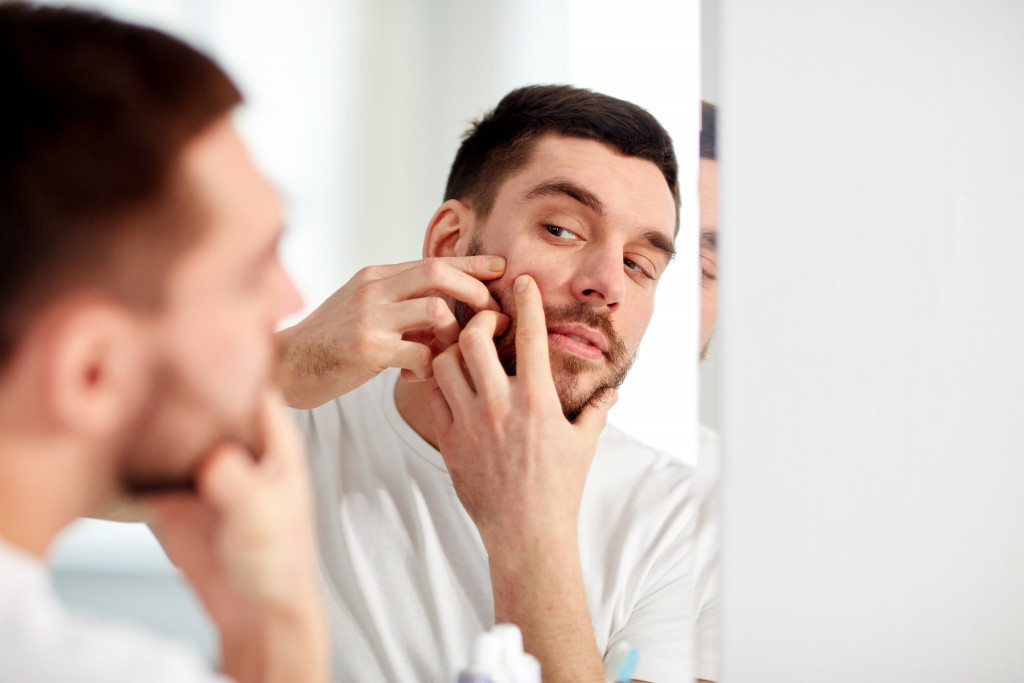Most men feel self-conscious and embarrassed about their skin, whether it’s acne, rosacea, psoriasis, or some other skin condition. They may not know how to deal with the problem or be reluctant to seek help. This can lead to frustration and a feeling of helplessness. But there are ways to deal with various skin issues, and many men find that they can improve their skin’s appearance by taking some simple steps.
Here are some tips to help you deal with various skin issues.
1. Acne
Many adult men suffer from acne, most common in teenage boys and young men. Acne is caused by a build-up of sebum (oil) and dead skin cells in the skin’s pores. This can lead to blackheads, whiteheads, or pimples. Some men find that their acne is worsened by stress, hormones, certain medications, and an unhealthy diet.
Many treatments for acne include over-the-counter medications, prescription medications, and natural remedies. You may need to try several treatments before finding one that works for you. It would be best to ask your doctor about ways to prevent acne flare-ups.
A quick remedy but temporary solution is to use makeup. Several types of makeup can help cover up blemishes if you feel self-conscious about your acne. Look for makeup that is labeled “non-comedogenic” or “oil-free.” These products are less likely to clog your pores and worsen your acne. Always make sure that you use only the best makeup for acne.

2. Rosacea
Rosacea is a chronic skin condition that can cause redness and visible blood vessels in the face. It can also cause pimples and bumps, and in some cases, the nose may become enlarged. Rosacea is most common in middle-aged women but can also affect men. Rosacea is thought to be caused by a combination of genetic and environmental factors.
There is no cure for rosacea, but there are treatments that can help improve the appearance of the skin. These include prescription creams and gels, laser and light therapies, and surgery. It would be best if you also avoided triggers that can make your rosacea worse, such as sun exposure, hot drinks, and spicy food.
If you have rosacea, it’s essential to be gentle with your skin. Use a mild cleanser and avoid scrubbing your face. Be sure to use sunscreen with an SPF of 30 or higher. Many rosacea sufferers find that wearing green-tinted makeup can help reduce the appearance of redness.
3. Psoriasis
When you have psoriasis, your skin cells grow faster than normal. This causes a build-up of dead skin cells on the skin’s surface. Psoriasis can cause red, scaly patches and can be itchy and painful. In some cases, psoriasis can also lead to joint pain. If you have psoriasis, you may be at increased risk for certain other conditions, such as diabetes and heart disease.
While there is no cure for psoriasis, there are treatments that can help to control the symptoms. These include topical medications, light therapy, and oral medications. You may need to try several treatments before finding one that works for you. Ask your doctor about ways to prevent flare-ups.
You can also take some steps to care for your skin if you have psoriasis. Use a mild soap or cleanser, and avoid scrubbing your skin. It’s also important to moisturize your skin regularly. This helps to reduce the dryness and itching that are common in psoriasis. If you have psoriasis on your scalp, you may find that shampooing with dandruff shampoo can help.
4. Eczema
Some men experience eczema, a condition that causes dry, itchy skin. Eczema can be caused by several factors, including allergies, stress, and certain medications. More often, however, the cause is unknown.
Eczema is usually treated with topical medications, such as creams or ointments. It would be best if you also avoided triggers that can make your eczema worse, such as harsh soaps, detergents, and excessive heat or humidity.
5. Skin cancer
Because men tend to have more exposure to the sun, they are at greater risk for skin cancer. Skin cancer is the most common type of cancer in the United States. There are three main types of skin cancer:
- Basal cell cancer is the most common type of skin cancer. It usually appears as a small, raised, pearly or waxy bump on the sun-exposed skin, such as the face, neck, or chest.
- Squamous cell cancer is a type of skin cancer that can appear as a firm, red bump or a rough, scaly patch on the sun-exposed skin, such as the face, neck, hands, or arms.
- Melanoma is the most serious type of skin cancer. It can appear as a new mole on the skin or a change in one of your existing moles. They can be black, brown, or tan but can also be flesh-toned, pink, red, purple, blue, or white.
If you notice any changes in your skin, it’s essential to see a doctor immediately. Skin cancer is treatable if it’s caught early.
Several skin conditions can affect men. Some, such as acne and dandruff, are relatively common and easy to treat. Others, such as skin cancer, are more serious but can be treated if they’re caught early. Be sure to see a doctor if you notice any changes in your skin.